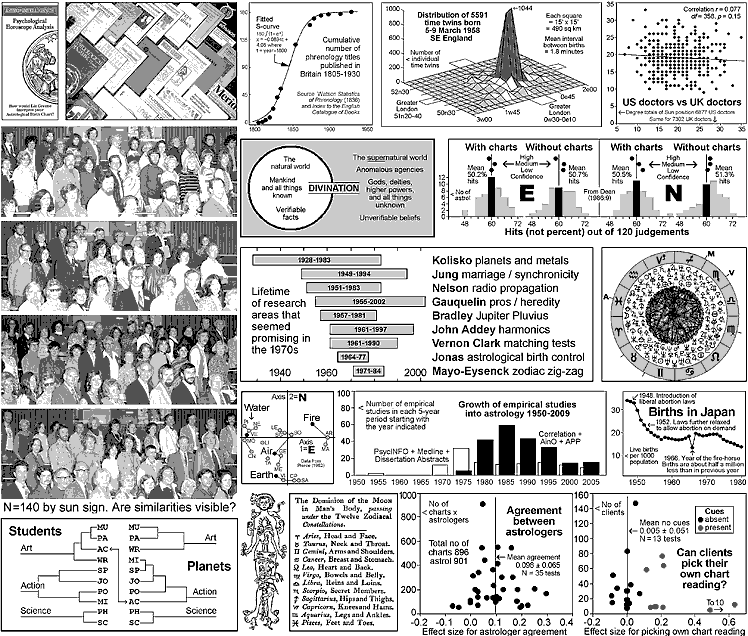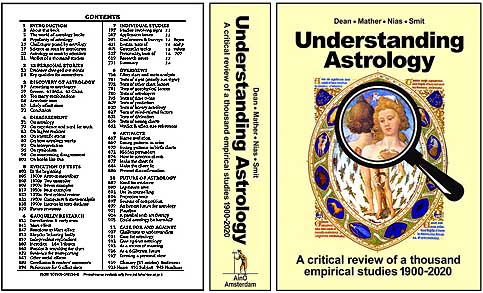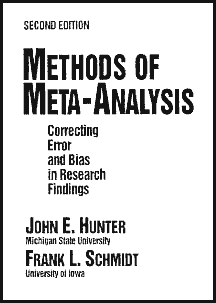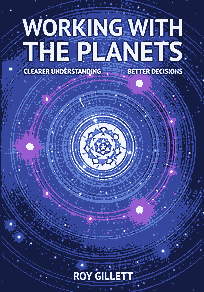From www.astrology-and-science.com 12m 12g 318kb Home Fast-Find Index
Understanding Astrology:
A critical review of a thousand empirical studies
1900-2020
Abstract -- Fifty years ago empirical studies (studies based on experiments) were the hardest things to find in astrology. There were only opinions. Today there are more than a thousand empirical studies hidden in a hundred journals and dozens of books, plus academic theses, conference reports, websites, unpublished studies, and little-known hard-to-find specialised collections. For the first time Understanding Astrology brings together ALL of these highly scattered studies -- not just the ones conveniently available or selected to prove a point -- and subjects them to rigorous critical thinking. It puts astrology under the microscope in a concise style free of waffle. The results explain why for many people there is more to astrology than being true or false.
Understanding Astrology has 952 pages, more than 650,000 words, 750 pictures, 650 graphs, nearly 500 tables, over 4000 references, glossary (85 entries), and name and subject indexes. Two-thirds is taken up with individual descriptions of the 1000 studies. The treatment is balanced (all four authors have strong science backgrounds, all are experienced writers, and two were once full-time professional astrologers and teachers of astrology). And there are no conflicts of interest (no author makes money from astrology or from sales of the book).
The book is Open Access and can be downloaded for free, but only in low resolution to keep file sizes small. Fine detail in pictures and graphs will be difficult or impossible to read. Hardcover copies with a durable sewn binding (lies flat) are available direct from the publisher for 65 euros (about $US60) excluding postage, see full article. The ISBN is 978908-249291-0 but to avoid high prices the book is not available from bookstores. It was published in late 2022, and also updates the present website. The present article includes readers' comments and five independent reviews.
Evolution of Understanding Astrology
Fifty years ago the calculation of birth charts was too time-consuming
for most researchers into astrological claims. As a result few empirical
research studies existed. They included John Nelson on shortwave
radio quality, Vernon Clark on the performance of astrologers, John
Addey on harmonics, and Michel Gauquelin on professional occupations.
All were reviewed in Recent Advances in Natal Astrology: A Critical
Review 1900-1976, the result of a unique international collaboration
between more than 50 astrologers and scientists from 10 countries plus
the resources of the AA's research section. (AA = UK's Astrological
Association founded in 1958 "to enlarge the knowledge of Astrology in a
scientific spirit".) The 1977 publication of Recent Advances led
in 1979 to the first of a series of annual London research conferences
and in 1981 to the re-launch of Correlation, the AA's journal
of research into astrology (nearly 20 years later the into
became in).
In the UK's Astrological Journal 20(4), 188-189 (1978), the 1977 book's long-overdue focus on scientific validity was both praised ("fascinating ... a joy to read ... amazing and long needed") and condemned ("arrogantly childish ... misses the truth ... built-in prejudices"). But outside the AA the book's 250,000 words, 110 figures, 1000 references, and 50+ compilers received much praise both internationally and in the UK:
 |
Reactions to Recent Advances
"A milestone in astrological book publishing" FAA Journal Australia. "The most important book ever written on astrology" Phenomena Publications Canada. "Of very high standard" Hamburger Hefte Germany. "A must for any serious scientific student of astrology" Astrological Magazine India. "One of the most important books of western astrology" Tijdschrift Astrologie Netherlands. "Packed with information" Journal of the Seasons NZ. "Easily readable and always informative" Cosmecology Bulletin USA. "You cannot do without this book" Horoscope USA. "The most talked-about astrology book ever" Emergence bookshop UK. "A major work, indeed the only one of its kind" Professor H J Eysenck, University of London. |
That was 5 decades ago. Since then there have been new tests, new approaches, and a thousand new studies using computers for astrological calculations previously impossible by hand. In other words a New Understanding is now within reach. But books continue to parade views either for or against based on incomplete surveys of a mostly hard-to-find literature with no nuanced views. So this new survey collects all the evidence -- not just the bits selected to prove a point -- and subjects it to rigorous critical thinking. The results explain why for many people there is more to astrology than being true or false.

This new survey evolved via earlier works published in
Amsterdam by AinO Publications, long-time publisher of research journals
and books for NVWOA, the Nederlandse Vereniging tot Wetenschappelijk
Onderzoek naar de Astrologie (Dutch Society for Scientific Study into
Astrology). The Society began in 1971, ten years before Recent
Advances led to the re-launch of Correlation, and was perhaps
the first society in the world to be aimed at both serious astrologers
and serious critics while maintaining high standards on both sides.
Shown above, the journals are the Dutch Tijdschrift Astrologie
(Journal of Astrology) started in 1977, Wetenschap & Astrologie
(Science & Astrology) 1981, Astrologie in Onderzoek (Astrology
under Scrutiny) 1986, and the same in English 2000. The books are
Astrology under Scrutiny 2013 featuring an anthology of articles
since the first issue, which was expanded into Tests of Astrology
2016 to include more international work (the cover illustrates Gauquelin's
famous Mars effect). Six more years of work led to the present
Understanding Astrology: A critical review of a thousand empirical
studies 1900-2020, published in late 2022, which in effect updates
the earlier 1900-1976 coverage of Recent Advances. It also involved
some of the original compilers and helpers.
At 1.8 kg Understanding Astrology is
seriously comprehensive
It has 952 pages 170x240 mm, and more than 650,000 words,
750 pictures, 650 graphs, nearly 500 tables, over 4000 references, glossary
(85 entries), name and subject indexes, and a concise style free of waffle.
The mean measured readability is well within ordinary education levels,
which with an average of just over one bold heading per page makes
navigation easy. Some parts are necessarily technical but there are always
plain-English summaries helped by hundreds of explanatory visuals like
these:

Availability
Hardcover copies with a sewn binding (lies flat) are available
direct from the publisher in Amsterdam for 65 euros each (about $US60
or the price of ten takeaway cups of coffee), excluding air mail postage
-- the Dutch post office does not deliver by sea mail. You can pay by
PayPal or ebank but not credit card. To check availability and postage
costs, please email the publisher wout DOT heukelom AT hetnet DOT nl.
The book has an ISBN (978908-249291-0) but is not available from bookstores
since this would more than double the price.
But Understanding Astrology is also Open Access and is available as a free download of four searchable pdf files totalling nearly 40 MB for nearly 1000 pages. But be warned that the pdf files are necessarily low resolution to avoid large file sizes, which means that fine detail in the visuals is often difficult or impossible to read. Each pdf takes up to three minutes to download depending on your computer and local traffic.
So why buy a hardcover copy?
You are welcome to print out a full copy rather
than squint your way through a thousand pages on-screen, but a hardcover
copy is only slightly more expensive (per page it costs 6c US vs 2c for
copy paper plus 2c for ink/toner), is nicer to look at, lies flat, is
critically sharp, and is much easier to use with no loose pages to
clutter your working space. As one Swiss reader told us, "I have seen
your website, downloaded the four pdfs, and would like to buy a hard
copy".
 |
Downloads |
Reactions to UA from astrologers
and academics
First astrologers:
"A mammoth undertaking ... will soon become the de
facto standard reference"
Philip Graves,
historian, world's largest astrology reference collection, Wales.
"It will be the classic sourcebook for all previous
astrology research"
Brad Kochunas,
licensed counsellor, Ohio.
"I am overwhelmed by its value to anyone interested
in astrological research"
Dr Peter Niehenke,
former president of the German Astrological
Association, Switzerland.
"Understanding Astrology is a book that every
serious astrologer would do well to tackle and face up to. There is a
vast amount of material that presents a serious and as yet unanswered
challenge to astrology as an objective science, especially within the
context of what it is that astrologers currently do in practice"
Chris Odle,
astrologer with 40 years experience, website StarToucher.earth.
"It is a wonderful book! Beautifully laid out, easy
to handle, choice of paper is excellent, size of the book is perfect.
And the pages lie flat without print being smashed into the center binding.
At $US60 is like giving away a book of such quality. Publishing the book
in hardback was an excellent choice. I expect I will be reading it for
many weeks, and sections for years. Many thanks for a miraculous
publication!"
Therese Hamilton,
veteran NCGR researcher in California.
"I consider this work to be a true masterpiece and I
am planning to spread its message, [for] the only way for astrology to gain
serious consideration is by acknowledging its shortcomings and then striving
for empirical evidence"
Aleix Mercadé,
Cosmograma School of Astrology (the largest school of
astrology in Spain
and its most active scientific research group).
Now academics:
"The ultimate guide, truly comprehensive, one of a kind, promotes
critical thinking"
Catherine Sinclair, researcher, Université
de Lyon, France.
"Surely THE definitive critical review of astrology
research"
Professor Caroline Watt,
University of Edinburgh, former president of the
Parapsychological Association, and author of
Parapsychology: A Beginners' Guide.
"Very impressive tour de force"
Professor James Alcock,
York University, Toronto, author of
Parapsychology:
Science or Magic? A psychological perspective, and
Belief: What it means to
believe and why our convictions are so compelling.
"The definitive work on the topic, will be consulted
for years to come"
Professor Richard Wiseman,
University of Hertfordshire, a former award-
winning professional magician, currently the psychologist most frequently
quoted in the British media, and author of many influential books including
Quirkology: The curious science of everyday
lives, and Paranormality: Why
we see what isn't there.
"Monumental accomplishment"
Professor John T Burns,
Bethany College, West Virginia,
author of two
annotated bibliograhies
Cycles in Humans and Nature, and Cosmic Influences
on Humans, Animals, and Plants.
"A milestone in bringing together in one place reported
studies and related writings on astrological claims that were previously
impossibly scattered. The result is a critical synthesis of information
well beyond the confines of astrology. For believers, skeptics, historians,
academics, and researchers generally, this is a challenging, invaluable
and unique resource"
Donald H Saklofske,
professor of psychology at the University of
Western
Ontario, past editor of Personality
and Individual Differences, and past
president of the International Society for the Study of Individual
Differences.
Published reviews of Understanding Astrology
Five reviews have been published. More are said to be coming but are taking time.
 |
The first review is by Ray Ward, a retired librarian, former believer in paranormal matters, and now a book reviewer with a special interest in astronomy and astrology. Unlike most modern reviewers of astrology books he was already familiar with Recent Advances and was able to revisit it at the British Library. His review in the quarterly Skeptical Intelligencer, published by the UK's Association for Skeptical Enquiry, 26(1), 10, 2023, is very brief (210 words) for reasons he is careful to explain. He concludes: |
In the Skeptical Intelligencer 19(4), 8-9, 2016 I reviewed Tests of Astrology: a Critical Review of Hundreds of Studies by Dean and others (AinO Publications 2016). Now comes this 'revised and enlarged edition'. It is nearly twice the size of its precursor, which I described as 'the most comprehensive summary of the subject', and this one is even more so. There would, however, be little point in attempting a full review, since everything I said about the earlier work applies to this one, which simply strengthens what the earlier work said. Just don't drop it on your toe, or the stars predict a trip to the hospital! [the book weighs 1.8 kg vs 0.4 kg for a typical paperback].
Ward's earlier review was quite thorough (1480 words). He quotes Recent Advances: "The astrological literature is filled largely with demonstrations of belief. What it is not filled with is demonstrations of truth;" and sees Tests of Astrology as supporting and strengthening this assertion: "It includes personal stories of astrologers and believers who changed their minds; the discovery of astrology; the evolution of tests and why they are needed; a whole section on the Michel Gauquelin work; hundreds of empirical studies over 1927-2015; test overviews; artifacts (including a good general discussion of why people see what they expect to see); the future of astrology; the case for and against; a glossary; and name, subject and book indexes."
He concludes with his own overview: [Tests of Astrology] ends with a summary prefixed by a quotation from Christopher Hitchens 'What can be asserted without proof can be dismissed without proof': there is no physical way astrology could work; hundreds of tests have shown it does not deliver useful factual truth; the claimed as above, so below links do not exist; charts are meaningful even when wrong; outcomes are explained by hidden persuaders; and claimed experience is unfounded because it is never tested under controlled conditions. Hits are chosen, misses ignored, failures explained away, and unwelcome test results dismissed because, it is said, astrology cannot be tested.
 |
The second review is by Terence Hines, professor of psychology at Pace University New York, adjunct professor of neurology at New York Medical College, and author of the acclaimed Pseudoscience and the Paranormal 2nd edition 2003, over 850 references, covering the whole field of paranormal claims and how to evaluate them scientifically. Beware "the constructive nature of memory and related cognitive illusions" (p.147), where the uninformed see only what they want to see. His review appeared in Skeptical Inquirer 47(5), 62-63, 2023. In 1400 words he outlines the book's eleven chapters and their contents. Here are some excerpts (540 words): |
Understanding Astrology is a thorough compilation and review of "under the radar" [ie hard-to-find] research, much of which is quite interesting. Its text is divided into eleven chapters. After the introduction, Chapter 2, Personal Stories, is unusual, entertaining, and informative. Chapter 3 is a brief (fourteen-page) history of astrology, including the Chinese and Hindu versions. Chapter 4, Disagreements in Astrology, covers both disagreements among astrologers and between astrologers and scientists.
Chapter 5 describes the early (starting in the 1500s) tests of astrology. Chapter 6 is devoted to one of the most contentious controversies in modern astrological research, Michel Gauquelin's [Mars effect]. The authors argue that the effect is real but not due to astrological influences. Their argument is both complex and convincing.
Chapter 7, Individual Studies, is by far the longest chapter in the book at 556 pages, or 60 percent of the total page count. Studies are described along with critiques when the authors of the studies claimed that their results showed a relationship when they did not. This an especially useful characteristic of the book. Studies are not just described but are critiqued. Where authors have made logical, methodological, or statistical errors, these are noted. Some of the studies summarized, as well as some of the authors' critiques, use sophisticated statistical analyses.
While Chapter 7 described and discussed each test of astrology individually, Chapter 8, Overviews, discusses tests by topic, such as tests of sun signs, tests of matching horoscopes to personality test results, and even tests of [time twins]. The chapter also covers statistical issues and concludes that there is no evidence that astrology has any validity. Those few tests that seem to support astrological predictions can "be explained by knowledge of serious astrology biasing the results." The authors (p.862) predict that "astrologers will no doubt see this conclusion as confirming the inability of critics to open their closed mind". Chapter 9 concerns artifacts that lead to belief in astrology, such as reliance on personal experience, confirmation bias, seeing patterns in random noise, and the representativeness heuristic, among others.
Chapter 10, Future of Astrology, is a short chapter of sixteen pages. This is appropriate because the large corpus of studies reviewed in this book show that astrology has no empirical foundation. Some astrologers resort to using it as a basis for counseling. But the authors wisely note that "Astrology by itself is not counselling. People with problems need to learn coping skills, but this will not happen unless the astrologer is properly qualified." Chapter 11, The Case for and against Astrology, approaches the issue from a broader perspective that asks whether astrology can be seen as a belief system that can function and be beneficial even though it is scientifically invalid.
To say that Understanding Astrology is comprehensive is an understatement. It covers every aspect of Western astrology that I can imagine in clear and concise detail. It took a huge amount of work to compile the information in the book. The coverage is not limited to material in English. The text is extensively illustrated with reproductions of diagrams and figures from the publications discussed. Also delightfully included are copies of relevant book covers, artwork, and amusing cartoons. In short, it is the definitive work on the status of astrology.





![The [UK] Skeptic logo](U-aino18.gif)